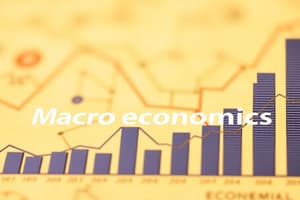Podcast
Questions and Answers
What does the term 'Economics' originate from?
What does the term 'Economics' originate from?
- A concept derived from political science
- A word meaning wealth management
- A word meaning household management (correct)
- A term related to financial systems
Why is choice necessary in economics?
Why is choice necessary in economics?
- Economics focuses on individual preferences only.
- Resources are abundant and can satisfy all wants.
- Resources are limited compared to our desires. (correct)
- All wants can be fulfilled without any management.
What does the word 'scarcity' refer to in economics?
What does the word 'scarcity' refer to in economics?
- An abundance of resources compared to needs
- A temporary shortage of resources
- Limited resources in relation to our wants (correct)
- A situation where all wants are fulfilled
Which principle of economics relates to the evaluation of additional benefits versus additional costs?
Which principle of economics relates to the evaluation of additional benefits versus additional costs?
Which of the following is one of the solutions to the problem of scarcity?
Which of the following is one of the solutions to the problem of scarcity?
Which principle of economics directly addresses how agents interact within the market?
Which principle of economics directly addresses how agents interact within the market?
How do economists typically approach the problem of resource scarcity?
How do economists typically approach the problem of resource scarcity?
The decisions made by households and societies are fundamentally similar in which aspect?
The decisions made by households and societies are fundamentally similar in which aspect?
How do instructors incentivize students in class?
How do instructors incentivize students in class?
What economic principle is highlighted by offering free solar panels to low-income earners?
What economic principle is highlighted by offering free solar panels to low-income earners?
What key factor defines the economic reality of a society?
What key factor defines the economic reality of a society?
How do economic agents best utilize their scarce resources?
How do economic agents best utilize their scarce resources?
What behavior do agents exhibit when conditions change?
What behavior do agents exhibit when conditions change?
What defines opportunity cost in decision-making?
What defines opportunity cost in decision-making?
If an individual chooses 1 KG of chicken instead of half KG of mutton, what is the opportunity cost?
If an individual chooses 1 KG of chicken instead of half KG of mutton, what is the opportunity cost?
When referring to the assumption of rationality in economic decision-making, what does it imply?
When referring to the assumption of rationality in economic decision-making, what does it imply?
What is a likely outcome when a good is purchased, considering scarcity?
What is a likely outcome when a good is purchased, considering scarcity?
What does the term 'tradeoff' signify in economic choices?
What does the term 'tradeoff' signify in economic choices?
In determining opportunity cost, what aspect should be considered?
In determining opportunity cost, what aspect should be considered?
Which of the following would NOT be an example of opportunity cost?
Which of the following would NOT be an example of opportunity cost?
What correct statement reflects the concept 'There is no free lunch'?
What correct statement reflects the concept 'There is no free lunch'?
What does the principle of tradeoffs imply about resource use?
What does the principle of tradeoffs imply about resource use?
How does achieving equality affect individual incentives according to the efficiency-equality tradeoff?
How does achieving equality affect individual incentives according to the efficiency-equality tradeoff?
What is the opportunity cost of choosing one alternative over another?
What is the opportunity cost of choosing one alternative over another?
In the context of social tradeoffs, what does efficiency refer to?
In the context of social tradeoffs, what does efficiency refer to?
Why is freshwater considered scarce in Pakistan, according to the principles discussed?
Why is freshwater considered scarce in Pakistan, according to the principles discussed?
What role do incentives play in decision-making according to the principles outlined?
What role do incentives play in decision-making according to the principles outlined?
How does a society's tradeoff between efficiency and equality manifest in real economic decisions?
How does a society's tradeoff between efficiency and equality manifest in real economic decisions?
What is marginal analysis used for?
What is marginal analysis used for?
Which of the following best describes marginal analysis?
Which of the following best describes marginal analysis?
What best describes the diamond-water paradox?
What best describes the diamond-water paradox?
In the scenario of a mechanic choosing between additional work or dinner, what concept is illustrated?
In the scenario of a mechanic choosing between additional work or dinner, what concept is illustrated?
How do rational people generally respond to incentives according to economic principles?
How do rational people generally respond to incentives according to economic principles?
What does it mean when individuals are said to face scarcity?
What does it mean when individuals are said to face scarcity?
What do higher prices as incentives typically lead to for consumers?
What do higher prices as incentives typically lead to for consumers?
If instructors penalize latecomers in class, what economic principle are they applying?
If instructors penalize latecomers in class, what economic principle are they applying?
What drives the decision-making process of rational individuals according to economic theories?
What drives the decision-making process of rational individuals according to economic theories?
Flashcards are hidden until you start studying
Study Notes
Economic Society
- Economics is a social science that examines society through an economic lens, influencing perceptions and decisions.
- The term ‘economy’ is derived from the Greek word "Oikonomos," meaning "one who manages a household," highlighting the parallels between household and societal resource management.
Scarcity of Resources
- Scarcity arises when resources are insufficient to meet wants, necessitating careful resource management at individual, societal, and global levels.
- Choice becomes imperative in scarcity, driving individuals to prioritize wants and economize on resource usage to maximize satisfaction.
Solutions to Scarcity
- Three possible ways to address scarcity:
- Economize by using resources efficiently.
- Create additional resources.
- Reduce or cut down on wants.
- Different perspectives on solving scarcity:
- Economists focus on efficient resource use.
- Physicists and biologists aim to create more resources.
- Philosophical approaches advocate for minimalism.
Ten Principles of Economics
- Tradeoffs: Individuals face tradeoffs due to limited resources and the need to prioritize wants.
- Opportunity Cost: The cost incurred by choosing one option over alternatives.
- Marginal Analysis: Decision-making based on the additional benefits versus costs of an action.
- Incentives: Factors that motivate and influence the behavior of individuals and firms.
- Trade, Markets, and Government: Mechanisms of interaction among economic agents.
- Productivity, Inflation, and Unemployment: Indicators of overall economic health and functionality.
Tradeoffs
- Tradeoffs due to scarcity mean pursuing one desire often involves sacrificing another.
- Societal tradeoff exists between efficiency (optimal resource use) and equality (fair distribution of resources).
- Example: Taxing a wealthier individual to redistribute income may harm their incentive to work harder, reflecting the efficiency-equality dilemma.
Opportunity Cost
- Defined as the value of the best alternative forgone when making a decision.
- Example: Choosing to purchase one good over another incurs an opportunity cost represented by the foregone second choice.
Rational Decision-Making
- Rational individuals systematically evaluate choices, aiming to maximize their outcomes based on available resources.
- Rationality assumes individuals consider consequences and act purposefully toward their objectives.
Marginal Analysis
- Used for making incremental decisions; involves evaluating the additional cost and benefit of a decision.
- Example: A busy mechanic weighing the benefits of finishing one more repair versus personal commitments reflects marginal analysis.
Diamond-Water Paradox
- Water, essential for life, is cheap due to its abundance relative to demand, while diamonds, less essential, are expensive due to their rarity and high marginal benefit.
Incentives
- Incentives drive actions within a market system, impacting supply and demand through price signals.
- High prices can motivate consumers to reduce consumption and producers to increase supply.
Conclusion
- Economic principles of scarcity and tradeoff shape societal realities.
- Economic agents are behaviorally guided by opportunity costs, rational decision-making, and responsiveness to incentives, adjusting their strategies as conditions evolve.
Studying That Suits You
Use AI to generate personalized quizzes and flashcards to suit your learning preferences.




